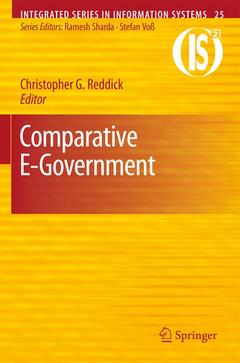Description
Comparative E-Government, 2010
Integrated Series in Information Systems Series, Vol. 25
Coordinator: Reddick Christopher G.
Language: English
Comparative E-Government
Publication date: 11-2012
682 p. · 15.5x23.5 cm · Paperback
Publication date: 11-2012
682 p. · 15.5x23.5 cm · Paperback
Comparative E-government (integrated series in information systems, Vol. 25)
Publication date: 09-2010
682 p. · 15.5x23.5 cm · Hardback
Publication date: 09-2010
682 p. · 15.5x23.5 cm · Hardback
Description
/li>Contents
/li>Comment
/li>
Comparative E-Government examines the impact of information and communication technology (ICT) on governments throughout the world. It focuses on the adoption of e-government both by comparing different countries, and by focusing on individual countries and the success and challenges that they have faced. With 32 chapters from leading e-government scholars and practitioners from around the world, there is representation of developing and developed countries and their different stages of e-government adoption. Part I compares the adoption of e-government in two or more countries. The purpose of these chapters is to discern the development of e-government by comparing different counties and their individual experiences. Part II provides a more in-depth focus on case studies of e-government adoption in select countries. Part III, the last part of the book, examines emerging innovations and technologies in the adoption of e-government in different countries. Some of the emerging technologies are the new social media movement, the development of e-participation, interoperability, and geographic information systems (GIS).
Comparing Countries and Regions.- E-government Maturity over 10 Years: A Comparative Analysis of E-government Maturity in Select Countries Around the World.- Framework of E-governance at the Local Government Level.- A Comparative Study of Contents of E-government Service Websites of Middle East and North African (MENA) Countries.- Towards E-participation in the Middle East and Northern Europe.- Evaluation of the Impact and Adoption of E-government Services in the Balkans.- A Challenging E-journey Along the Silk Road: Lessons Learned from E-governments in China and India.- Digital Government in North America: A Comparative Analysis of Policy and Program Priorities in Canada, Mexico, and the United States.- Adoption of Web 2.0 by Canadian and US Governments.- E-government and Federalism in Italy and Canada—A Comparative Assessment.- Adoption of E-government by Disadvantaged Groups in the United States and the United Kingdom.- Implementing E-Government Locally—An Empirical Survey from the European Metropolitan Area Rhine-Neckar.- Country Case Studies.- E-government Adoption Landscape Zambia: Context, Issues, and Challenges.- Challenges of Effective E-governance: Problems of Transparency, Infrastructure, and Connectivity in Kenya.- The Politics of E-government in Spain: Between Recent Innovations and Old Inertias.- Technological Adoption of a Privatised E-government: Implications for Democracy and Socially Marginalised Communities in Brazil.- The Challenges of E-governance in a Small, Developing Society: The Case of Trinidad and Tobago.- Towards E-government Transformation in Turkey: Policy and Implementation.- Measuring E-government Adoption by Governments: The Greek Case.- Critical Factors for Adoption of E-government: Validity of Adoption Model in Indian Context.-Conceptualizing and Implementation of E-government in India.- E-government in the Turkish Republic of Northern Cyprus.- SCRAN’s Development of a Trans-national Comparator for the Standardisation of E-government Services.- Innovations and Emerging Technologies.- Public Participation Geographic Information Systems: A Literature Survey.- Learning with GIS-Based Monitors in the Netherlands.- Bridging the Other Divide: An Assessment of the Usability of Trinidad and Tobago Government Ministry Websites.- E-government in New Zealand: Local Governments, Digital Divides and the National Digital Strategy.- A Study of E-government and Political Indicators in Developing Nations with and Without Access-to-Information Laws.- Socializing E-governance: A Parallel Study of Participatory E-governance and Emerging Social Media.- E-government, Accountability, and Performance: Best-in-Class Governments in European Union Countries.- The OECD Budgetary Transparency: An Examination of Online Budgetary Information Across European Union Countries.- Does Size or Geography Matter? Empirical Analysis of Finnish Local Government Services on the Internet.- E-Government Interoperability Framework: A Case Study in a Developing Country.
The first book to present e-government studies from developed and developing countries worldwide Brings the field completely up to date Presents studies conducted by leading scholars from each region of the world Includes supplementary material: sn.pub/extras
© 2024 LAVOISIER S.A.S.




